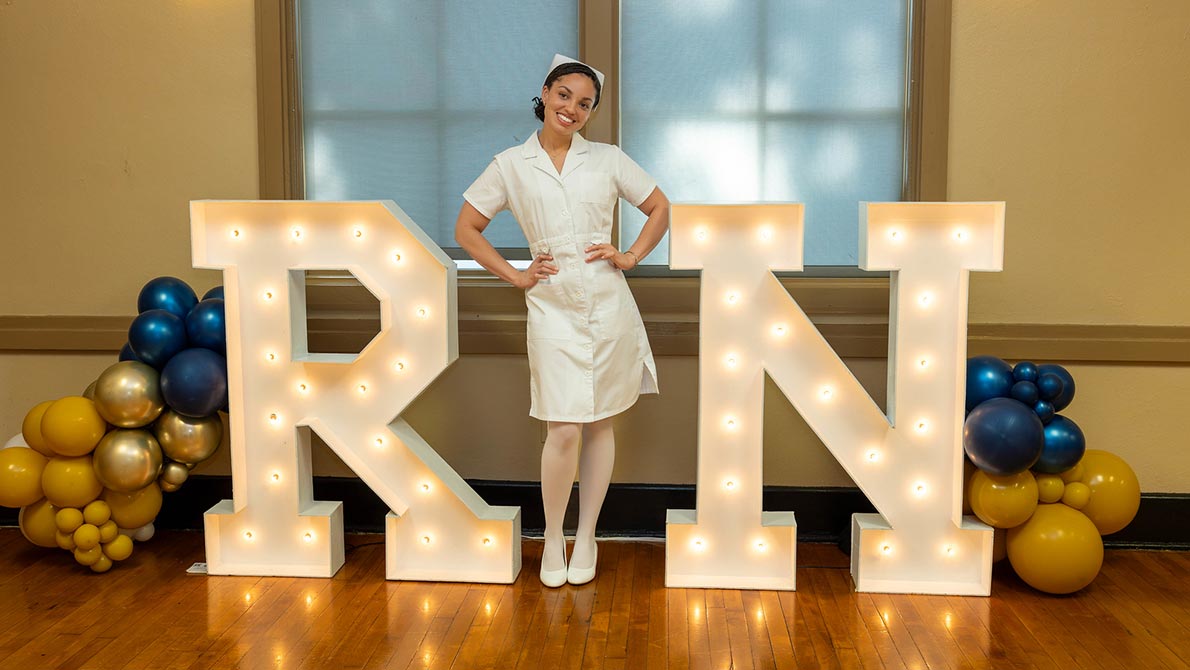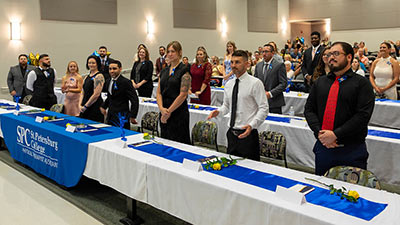How to Become a Nurse in Florida: Education & Licensing Explained
SPC Marketing | 3/4/2025

Embarking on a career in medicine is a journey filled with both exhilarating opportunities and challenging obstacles. In this blog post, we’ll outline the key steps to become a Registered Nurse (RN) in Florida, guiding you through everything from selecting the right educational program to mastering the licensing process. Whether you're at the beginning of your nursing career or transitioning to the Sunshine State, this comprehensive guide will offer you clear and actionable steps to advance with confidence.
What Is an RN?
An RN, or registered nurse, is a licensed medical professional who works alongside doctors to provide hands-on care, patient education, and emotional support. RNs can work in a variety of settings, including hospitals, physicians’ offices, schools, and senior care facilities, where they handle tasks ranging from conducting physical exams and evaluating symptoms to educating the community about conditions and preventative care.
How to Become an RN
Becoming an RN involves several key steps, and while the requirements are generally consistent across the country, the process can vary slightly depending on your location. Here’s a general timeline and overview of what’s involved, regardless of where you are:
- Earn a two-year associate degree or a four-year bachelor’s degree in nursing. An associate degree is a faster means to gain foundational knowledge and skills required of nursing. In two years, students log hours in the classroom and in clinical settings. A bachelor’s degree offers a more comprehensive and advanced education, including classroom and clinical training. Different nursing programs can lead to different degrees, including:
- Licensed Practical Nurse (LPN): Learn basic patient care, which you will perform under the supervision of an RN while on the job. LPNs are responsible for keeping families updated on a patient’s condition and helping them understand, in lay terms, what level of care is required. In certain states and certain certifications, they are authorized to start intravenous (IV) fluid drips and administer IV medications. LPNs can generally draw blood in most states, though specific regulations may differ.
- Registered Nurse (RN): Provide comprehensive care by assessing, planning, and implementing patient needs. RNs are involved in complex procedures, medication administration, and patient education. RNs often have a broader scope of practice compared to LPNs, including leadership and coordination roles. They typically hold a two-year Associate Degree in Nursing (ADN) or a four-year Bachelor of Science in Nursing (BSN).
- Bachelor of Science in Nursing (BSN): This is a four-year degree that prepares nurses with advanced knowledge and skills in nursing practice, leadership, and research. BSN programs include coursework in nursing theory, public health, and management, along with extensive clinical experience. BSN-educated nurses often have opportunities for advanced roles in healthcare settings, including positions in management, specialized care, and research.
- Certified Nursing Assistant (CNA): Assist with daily living activities such as bathing, dressing, and eating, along with monitoring vital signs and patient mobility. The CNA role is crucial in providing foundational support and comfort to patients. Training is typically shorter in duration than LPN and RN programs, with an emphasis on practical skills and patient care.
- Pass the National Council Licensure Examination (NCLEX). This standardized test is required to obtain nursing licensure. There are two versions: NCLEX-RN, for registered nurses, and NCLEX-PN for practical nurses. Register for the exam online, through the Nursing Regulatory Body (NRB) and Pearson VUE. The cost for each version of the test is $200. This computerized test mostly consists of multiple choice questions, but includes some fill-in-the-blank and drag-and-drop questions.
- Apply for licensure. After passing the NCLEX, you’ll need to apply for a nursing license with the state board where you plan to practice. This requires several steps:
- Submit the licensure application by providing basic identifying information, details on your educational background, NCLEX exam results, and any prior nursing licenses you held.
- Pay fees; typically several hundred dollars
- Pass any required, state-specific examinations
- Wait to hear from the state nursing board that will review your application materials.
- Once your license has been approved, make sure you understand the renewal process and requirements.
- Find a job. When you’ve received your nursing license, it’s time to start looking for employment opportunities. Start by searching job platforms such as Indeed, LinkedIn, and specialized healthcare sites. Be sure to check with the careers services sector of your school, which may be able to provide you with job placement assistance or alumni connections. Be sure to visit the websites of hospitals, clinics, schools and other facilities directly, as they often post job openings on their career pages.
RN License Requirements in Florida
In Florida, RN candidates must meet several requirements set by the Florida Board of Nursing:
- Complete an accredited nursing program, which typically culminates in an Associate's or Bachelor’s degree in Nursing.
- Pass the NCLEX-RN exam.
- Submit an application to the Florida Board of Nursing, including a criminal background check and any specific requirements regarding previous legal or disciplinary actions.
The process is different for out-of-state RNs who have already passed the NCLEX. To earn a licensure by endorsement, you must:
- Provide proof of an active license in another state, or ensure you have actively practiced nursing in another state, jurisdiction, or territory of the United States for at least two of the past three years without any criminal history or disciplinary actions by any licensing authority.
OR - Take a remedial course specified by state law if you have not been active in nursing within the past five years.
Florida has a mandatory continuing education (CE) requirement for all RNs. You will need to provide proof of completed CE hours and pay a renewal fee. Required subject areas, hours, and frequency are as follows:
- 2 hours on medical error prevention
- 2 hours on nursing laws and rules
- 2 hour on human trafficking
- 1 hour on HIV/AIDS (required as a one-time course before your first renewal)
- 2 hours on recognizing impairment in the workplace (required every four years)
- 2 hours on domestic violence (required every third renewal, or every six years)
Florida RN Industry Outlook
Florida stands out as one of the top states in the U.S. for RN employment with 189,120 registered nurses earning an average annual salary of $82,320. That’s not far off from the national average annual salary for RNs, which sits at $86,070 or $41.38 per hour.
CareerOneStop reports that there are a total of 3.1 million RNs across the nation and 6% projected growth through 2032 — double the average growth rate for all occupations.
We discussed earlier how there are many opportunities for RN work across industries, with the most prominent and lucrative being:
- Government: $99,840
- Hospitals; state, local, and private: $84,430
- Ambulatory health: $81,230
- Nursing and residential care facilities: $79,280
- Educational services; state, local, and private: $71,550
Nurses employed in hospitals and long-term care facilities often work in shifts to ensure continuous coverage throughout the day and night. This means they may need to work during nights, weekends, and holidays. Additionally, they might be on call, requiring them to be available with little notice. In contrast, nurses working in office settings, schools, or other non-24-hour care environments typically enjoy more consistent working hours.
FAQs
How long does it take to become an RN in Florida?
Becoming an RN in Florida takes, on average, two to four years, depending on your chosen educational path. An Associate Degree in Nursing (ADN) generally takes about two years to complete, while a Bachelor of Science in Nursing (BSN) typically takes four years. After completing the required degree, you must pass the NCLEX-RN exam and meet any additional state-specific licensing requirements.
What is the fastest way to become an RN?
Earning an associate degree in nursing, which takes about two years to complete, is often the quickest first step toward a career in nursing. The shortened timeline is due to condensed coursework and clinical hours. However, it’s important to ensure that the program is accredited and meets state licensing requirements. After completing the program, passing the NCLEX-RN exam and meeting state-specific licensing requirements will be necessary to obtain your RN license.
What is the fastest way to become a nurse in Florida?
The process of becoming a nurse in Florida is in line with requirements in other states. Prospective RNs must earn a degree and pass the NCLEX-RN exam before submitting an application to the Florida Board of Nursing.
From choosing the right nursing program to understanding licensing requirements, this journey is an investment in your future and a step toward making a difference in the healthcare field.
Learn more about nursing programs at St. Petersburg College.



